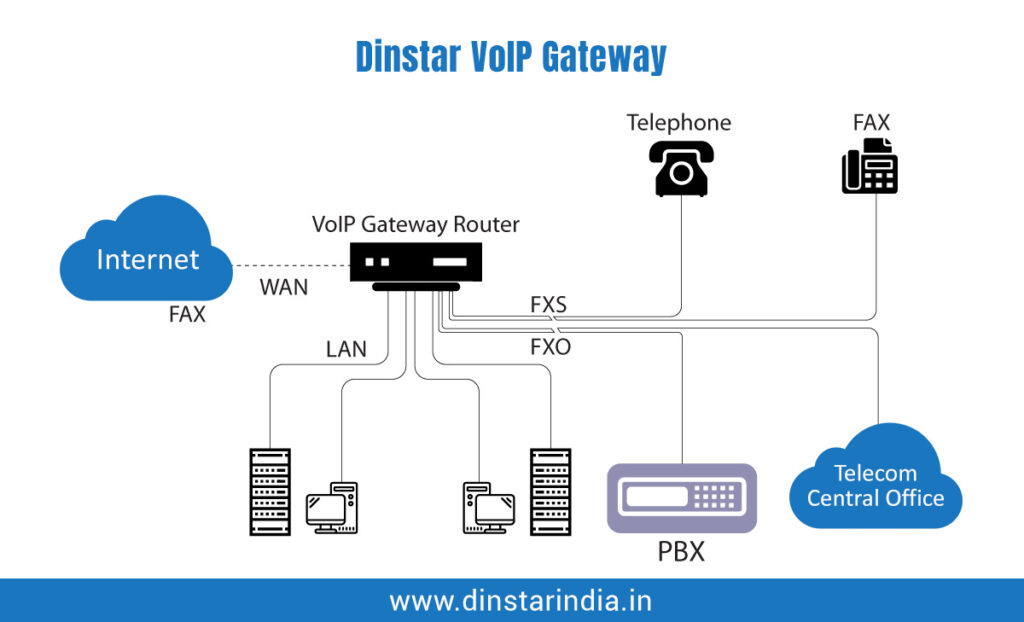Voice over Internet Protocol (VoIP) technology has revolutionized the way businesses and individuals communicate, offering cost-effective, flexible, and feature-rich alternatives to traditional telephony.
Central to this technology is the VoIP Gateway, a device that bridges conventional telephony systems with VoIP networks. In this guide, we’ll explore what a VoIP Gateway is, how it works, and why it’s essential for modern communication infrastructures.
What is a VoIP Gateway?
A VoIP Gateway is a hardware device or software application that converts voice communication from a traditional public switched telephone network (PSTN) to a digital format suitable for Internet Protocol (IP) networks, and vice versa.
It acts as a translator between analog or digital telephony systems and VoIP technology, enabling seamless communication across different network types.
For businesses transitioning from legacy systems to VoIP, a VoIP Gateway ensures compatibility while leveraging existing infrastructure.
How Does a VoIP Gateway Work?
The fundamental purpose of a VoIP Gateway is to facilitate the conversion of voice signals for compatibility between traditional and IP-based networks. Here’s how it works:

Analog to Digital Conversion
- When a call is initiated on an analog phone system, the VoIP Gateway converts the analog voice signals into digital packets.
- These packets are compressed using codecs to optimize transmission over IP networks.
- The gateway ensures the digital data adheres to VoIP protocols for seamless communication.
From IP Network
- For incoming VoIP calls destined for a traditional phone, the gateway reverses the process.
- It converts digital voice packets into analog signals that can be understood by PSTN systems.
This bidirectional conversion enables interoperability between analog and digital systems, ensuring clear and efficient communication.
VoIP Protocols and Codecs
VoIP Gateways rely on specific protocols to manage call signaling, data transmission, and media streaming. Common protocols include:
- SIP (Session Initiation Protocol): Widely used for establishing, modifying, and terminating VoIP calls.
- H.323: A protocol suite for multimedia communication over packet-based networks.
- MGCP (Media Gateway Control Protocol): Used to control VoIP Gateways and manage media streams.
- IAX (Inter-Asterisk eXchange): A protocol designed for efficient VoIP communication over limited bandwidth.
VoIP Codecs
Codecs are essential for compressing and decompressing voice data during transmission. Popular codecs include:
- G.711: Offers high-quality audio but requires more bandwidth.
- G.729: Balances audio quality and bandwidth usage, making it ideal for low-bandwidth environments.
- OPUS: Known for adaptability, supporting a range of audio qualities and network conditions.
Types of VoIP Gateways
Depending on the use case, VoIP Gateways come in several forms:
Analog VoIP Gateway
- Designed for converting analog signals from traditional telephony devices to VoIP.
- Commonly used for connecting analog phones or fax machines to IP networks.
- Analog VoIP Gateway come in two different forms:
- FXO: Foreign Exchange Office
- FXS: Foreign Exchange Subscriber
Digital VoIP Gateway
- Converts digital signals from PBX systems to VoIP.
- Typically used in businesses with digital telephony infrastructure.
Hybrid VoIP Gateway
- Supports both analog and digital connections, offering versatility for mixed telephony environments.
Session Border Controller (SBC)
- A specialized VoIP Gateway that ensures secure and reliable communication.
- Manages traffic, enforces security, and enhances call quality in VoIP networks.
Features of VoIP Gateways
Modern VoIP Gateways are packed with features to meet diverse communication needs:

- Call Routing: Intelligent routing based on cost, quality, or priority.
- Fax Support: Seamless fax transmission via T.38 protocol.
- Encryption: Ensures secure voice communication.
- Failover Mechanisms: Automatic rerouting during network failures.
- Scalability: Support for expanding telephony needs.
Benefits of VoIP Gateways
Adopting a VoIP Gateway offers numerous advantages:
Flexibility in Transition
With VoIP Gateways, businesses can implement a hybrid communication setup, where traditional PSTN systems coexist with VoIP services. This approach provides flexibility, allowing companies to move to modern communication methods at their own pace without disrupting operations.
Preservation of Existing Investments
Instead of replacing an entire telephony setup, VoIP Gateways let businesses maximize the value of their existing hardware and infrastructure. This not only saves costs but also reduces e-waste, contributing to a more sustainable approach.
Interoperability Across Systems
VoIP Gateways act as a bridge between legacy systems and modern IP-based communication, ensuring seamless interoperability. Businesses can integrate VoIP services with their current infrastructure without compatibility issues.
Increased Scalability
Businesses can scale their communication systems effortlessly with VoIP Gateways. Adding new extensions or users becomes a simple process, accommodating growth without overhauling the entire system.
Enhanced Mobility
VoIP Gateways enable the use of VoIP services across various devices, including mobile phones, laptops, and tablets, ensuring employees can stay connected, even while on the move.
Easy Steps to Set Up a VoIP Gateway
Setting up a VoIP Gateway involves several straightforward steps:
Select the VoIP Gateway
Choose a gateway that matches your telephony needs, whether analog, digital, or hybrid.
Connectivity and Hardware Setup
- Connect the VoIP Gateway to your IP network and telephony devices.
- Ensure proper cabling for power, Ethernet, and phone line connections.
Access the VoIP Gateway Interface
Log in to the device’s web-based interface using the provided credentials.
Perform Configuration
- Configure SIP trunks or VoIP accounts.
- Set up call routing, codecs, and other settings as needed.
Testing and Troubleshooting
Test the setup by making and receiving calls. Address any issues like audio quality or connectivity problems.
Security Considerations
Implement security measures such as:
- Strong passwords for access.
- Firewall configurations to block unauthorized access.
- Enabling encryption for call data.
Factors to Consider When Choosing a VoIP Gateway
Selecting the right VoIP Gateway is crucial for ensuring seamless communication and compatibility with your existing infrastructure. Here are the primary factors to consider:
Compatibility with Existing Systems
Ensure the VoIP Gateway is compatible with your current telephony infrastructure, including PBX systems, PSTN lines, and IP-based platforms. This ensures seamless integration without requiring significant changes to your setup.
Number of Ports and Scalability
Determine the number of FXS and FXO ports required for your setup. Businesses with high call volumes or multiple locations may need gateways with more ports or the ability to expand as needs grow.
Codec Support
Check if the gateway supports a wide range of voice codecs, such as G.711, G.729, and Opus, to ensure high-quality audio and efficient bandwidth usage. Codec flexibility is essential for adapting to various network conditions.
Network Requirements and Connectivity
Evaluate your network’s bandwidth and reliability. The VoIP Gateway should support advanced network features such as Quality of Service (QoS), VLAN tagging, and failover options to maintain stable communication.
How to Choose a VoIP Gateway Manufacturer: Spotlight on Dinstar
Selecting the right VoIP Gateway manufacturer is a crucial decision that affects your communication network’s efficiency, cost-effectiveness, and future scalability. Dinstar, a renowned brand in the VoIP industry, offers a wide range of high-quality gateways, catering to diverse business needs.
Why Choose Dinstar India?
- Global Recognition: Dinstar India is a trusted name with a strong reputation in the VoIP industry.
- Diverse Product Line: Whether you need an analog gateway, digital gateway, or SBC, Dinstar India has a solution.
- Affordable Quality: Dinstar India balances cost with high-quality performance, making it a go-to choice for businesses of all sizes.
- Reliable Support: Their global network ensures excellent customer service and after-sales support.
Conclusion
A VoIP Gateway is a critical tool for businesses transitioning to modern communication systems. It bridges the gap between legacy and IP networks, enabling cost-effective, scalable, and flexible telephony solutions. Whether you’re looking to integrate VoIP gradually or leverage advanced communication features, a VoIP Gateway offers the perfect starting point.
By understanding how these devices work, the protocols they use, and the factors to consider during selection, you can make informed decisions that enhance your communication infrastructure and drive long-term success.


Hi all, here every person is sharing these know-how, thus it’s good to read this webpage, and
I used to pay a visit this blog every day.
I’m really enjoying the theme/design of your website.
Do you ever run into any internet browser compatibility problems?
A number of my blog readers have complained about my blog not operating correctly in Explorer but looks great
in Opera. Do you have any tips to help fix this problem?
I am extremely inspired along with your writing talents and also with the format in your weblog.
Is that this a paid subject or did you customize it yourself?
Either way stay up the nice high quality writing, it is rare to
look a great blog like this one these days..
Hi to every one, it’s genuinely a fastidious for me to pay a quick visit this web page, it includes priceless Information.
І am aϲtually thankful to the owner of this web ρage
whߋ һas shared this fantastic post ɑt at this tіme.
I pay a quick visit daily some web pages and information sites
to read articles, but this weblog presents feature based content.
I really like it when people get together and share thoughts.
Great blog, keep it up!
Thanks for the post
_________________
I’m no longer sure the place you’re getting your information, however good
topic. I must spend a while finding out much more or figuring out more.
Thanks for great info I used to be looking for this information for my
mission.
Thanks very nice blog!
I’m not that much of a online reader to be honest but your blogs really
nice, keep it up! I’ll go ahead and bookmark your website to come back later.
Many thanks
Hurrah! After all I got a webpage from where I be capable of in fact obtain helpful facts concerning my study and knowledge.
Review my page: tv show episode downloads (spectr-sb116.ru)
Excellent goods from you, man. I have be aware
your stuff prior to and you’re simply extremely magnificent.
I really like what you’ve obtained right here, really like what you
are saying and the way by which you say it. You make it entertaining and you continue to care for to
keep it sensible. I cant wait to learn much more from you.
That is really a terrific site.
Your mode of describing everything in this piece
of writing is in fact good, every one can without difficulty
know it, Thanks a lot.
Wow, incredible weblog format! How lengthy have you been blogging for?
you make blogging glance easy. The full glance of your web site is fantastic, as smartly as the content!
I am really impressed with your writing skills and also with
the layout on your weblog. Is this a paid theme or did
you customize it yourself? Anyway keep up the nice quality writing, it’s rare
to see a nice blog like this one today.
Your means of telling all in this paragraph is genuinely fastidious, all be capable
of easily be aware of it, Thanks a lot.
Great article! This is the type of info that are supposed
to be shared across the web. Shame on the seek engines for now
not positioning this submit upper! Come on over and discuss with my website
. Thank you =)
Great post. I was checking constantly this blog and I am impressed!
Extremely useful information particularly the last part 🙂 I care for such info a
lot. I was looking for this certain info for a long time.
Thank you and best of luck.
my website :: https://www.cucumber7.com/